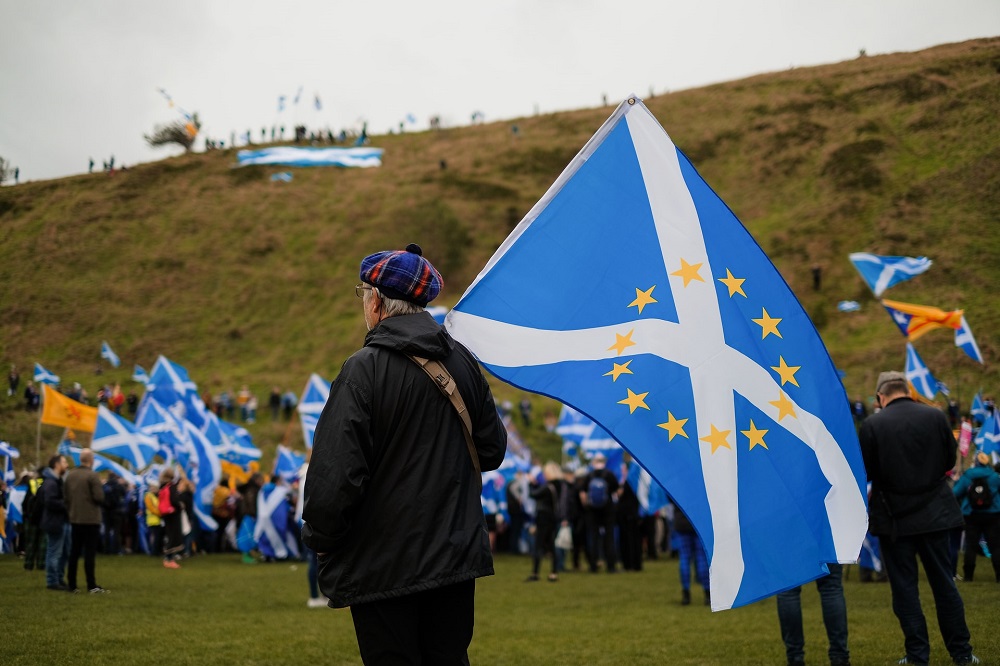
Brexit is simultaneously reshaping the United Kingdom’s constitutional order and transforming its place in Europe and the world. It is a monumental project which, despite Britain’s formal departure from the European Union at the end of January, has in many respects barely begun.
During the post-Brexit transition that will last for the rest of this year, the UK largely operates as if it were still functionally part of the EU, without any political representation or say in EU decision-making. Negotiations on a new EU–UK relationship have not gone well. Even if they succeed, London has opted for a free trade agreement plus other cooperation—a remarkably distant relationship, considering the EU’s importance to the UK’s prosperity.
In the Brexit era, the UK intends to build a new foreign policy. But, aside from disconnecting from the EU, it remains ill-defined, beyond a preference for free trade and an interest in power projection. The UK government’s premise of ‘global Britain’ remains a catchphrase, not a doctrine.
Moreover, this direction of travel is highly contested across the different parts of the UK. In Scotland, opposition to Brexit has been strong and consistent. The Scottish electorate never endorsed Brexit and opinion polls indicate that a clear majority wishes to rejoin the EU (whether as part of the UK or through independence).
Scottish politics operates from a well-rooted consensus in favour of European integration. Scotland’s political institutions have been influenced in their development by European counterparts. The Scottish parliament continues to fly the European flag (following a plenary vote to reaffirm the policy).
The Scottish National Party (SNP), the sole governing party since 2007, advocates an independent Scotland as a member of the EU. However, support for Europe crosses both sides of the independence divide. More to the point, Scotland’s mainstream Europeanism isn’t going away.
Throughout the Brexit process, the Scottish government has worked to demonstrate its pro-EU approach in its European and international relations, differentiating itself from the UK government and its pro-Brexit mission. Edinburgh has made clear its commitment to the EU’s founding principles and called for a close relationship with the EU—positions which have been noted in Brussels and European capitals.
Beyond rejecting the destination of Brexit, indications are that the Scottish government will also distance itself from the UK’s reinvented foreign policy. For instance, it has opposed the merger of the Foreign and Commonwealth Office with the Department for International Development.
The Scottish government also recently made an intervention related to the West Bank, which was somewhat uncharacteristic, as the SNP has traditionally been cautious on undertaking direct foreign policy action. Future statements on other international matters could represent the Scottish government’s intention to articulate its own views directly, including where they might differ from those of the UK government.
The recent publication of the parliamentary intelligence and security committee’s long-awaited report on Russia’s state interference in the UK—whose release was obstructed by Boris Johnson—generated significant media headlines on the claim of Russian interference in Scotland’s 2014 independence referendum. Yet the report only mentions Scotland in one paragraph. The committee states that it found expert commentary asserting such interference in the referendum to be credible.
The published version of the report doesn’t reference any intelligence or further evidence to support the premise. In any case, the 2014 referendum was a robust democratic exercise, with a very high voter turnout (85%) and a clear, accepted result. Since the vote, debate has continued on the extent to which London-based media—and, in particular, the BBC—were biased against independence. Those media attitudes undoubtedly had a much greater influence on the referendum than Russia or any other external actor.
In recent years, the Scottish government has expanded its external representative offices, particularly within Europe. Besides its longstanding presence in Brussels, it now has representations in Paris, Berlin, Dublin and indeed London. This nascent paradiplomatic network will continue to mature over time, providing avenues for direct engagement in European capitals.
Scotland will face challenges in maintaining its European connections, now that it is part of a third country to the EU. But it will still have space to cultivate opportunities not available to the wider UK, due to its pro-European outlook. The European Friends of Scotland Group, established shortly before the UK left the EU and composed of members of the European Parliament with an interest in the country, is one promising forum.
Other opportunities will depend upon how Scotland’s European debate evolves. For all its pro-EU sentiment, Scottish politics is in fact largely disconnected from the EU’s major discussions. Expressing a desire to contribute to the forthcoming Conference on the Future of Europe would be one way to indicate continued interest in the EU’s direction.
Over the coming years, Scotland will undoubtedly seek to project an increasingly distinct voice in Europe and the world. Its emergent foreign policy would benefit from greater structure, whether through an overarching strategy or guiding principles.
Developing cogent European and international strategies, based on Scotland’s values and interests, would allow the Scottish government to demonstrate nous in international relations and to showcase how Scotland might conduct itself as an independent state. At the same time, Scotland can make contributions to European and global affairs from its current constitutional position.
The Scottish independence debate is evolving and a new referendum feels inevitable. With recent majority support for statehood in opinion polls, an independent Scotland within the next few years is a serious prospect. How Scotland relates to the rest of Europe and the wider world will be a central aspect of the conversation to come.

